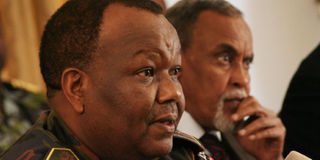Army will leave Somalia when border is safe, says Karangi

Chief of Defence Forces General Julius Karangi flanked by Defence minister Yusuf Haji addresses an international news conference about the Operation Linda Nchi at the Department of Defence headquarters in Nairobi October 29, 2011. General Karangi said the military's mandate will end when the common border is safe enough. PHOEBE OKALL
The Chief of Defence Forces Julius Karangi has said Kenya's operation in Somalia is not time bound.
General Karangi said the military's mandate will end when the common border is "safe enough".
"The campaign is not time bound. We (army) will pull out when we feel safe enough along the common border," he said during an international news conference at the Department of Defence (DoD) headquarters in Nairobi Saturday.
He said the army will ensure a "highly degraded Al- Shabaab capacity" before leaving the battlefront.
He restated that the military was not interested in annexing Somalia and was not at war with the horn of Africa country.
General Karangi said Kenya's offensive was against the Al-Shabaab, an outfit he described as a "non state actor".
"We are pursuing legitimate Al-Shabaab targets across the border," he said.
He discounted reports that the operation to pursue the terror group was pre-planned saying that the decision was arrived at within a space of ten days.
"On October 4, the government mandated the army to defend Kenya against the Al-Shabaab menace," General Karangi said.
He said that ten days later, the Kenyan troops entered Somalia with the intention of pursuing the Al-Shabaab
"The operation was not pre-planned. It happened at the spur of the moment. There was no plan to enter Somalia, annex it. No self respecting country would do so."
General Karangi said Kenya had invoked Article 51 of the UN Charter and the Constitution that give the country the "right to self defence".
He lamented that the Al- Shabaab was training Kenyan youths deep in Somalia and the "radicalised youths are sent back as terrorists in their own country".
He said the army had suffered one fatality killed by Al- Shabaab fire, not more that five wounded and that three soldiers were missing. General Karangi said the soldiers have not been accounted for since July when they disappeared.
He said that the Al-Shabaab was not a "conventional army" and therefore could not give a specific assessment of their body count.
"A battle damage assessment, however, shows that casualties run into several hundreds," said General Karangi.
On the question of the size of the military pursuing the militia, he said it "was sufficient to deal with the task at hand".
Internal Security permanent secretary Francis Kimemia said the government will offer amnesty to local Al-Shabaab if they came forward.
On Friday, Elgiva Briwe Oliacha was sentenced to life in prison after pleading guilty to grenade attacks near the OTC bus stage and at Mwaura's Pub in downtown Nairobi.
A 15-year sentence for Al-Shabaab membership and another of seven years for illegal possession of firearms is in abeyance.
"A deterrent sentence is called for so as to serve not only in the public interest but to deter would be offenders," Nairobi magistrate Grace Macharia said when handing down the sentence.
Two other Kenyans, Omar Muchiri Athuman and Stephen Macharia were charged separately and denied being Al- Shabaab members and possessing arms illegally.
At the briefing, Defence minister Yusuf Haji said Kenya's offensive in Somalia was about "fighting terrorism and not a Muslim-Christian war".
A representative from the Foreign ministry, Patrick Wamoto, said a Somalia delegation led by Prime Minister Abdiweli Mohammed and the Defence minister is expected in the country "anytime tomorrow" for clear-the-air talks.
Somalia's President Sheikh Sharif Ahmed has called Kenya's action in Somalia "inappropriate" while his PM has backed the incursion.
General Karangi said the military was carrying out "pacification operations" in the few pockets under Al-Shabaab's control.
Already, the army has captured several Somalia towns including Dhobley and Tabda.
Also present at the DoD briefing were: Police Commissioner Mathew Iteere, Information permanent secretary Bitange Ndemo and State House comptroller Nelson Githinji.




